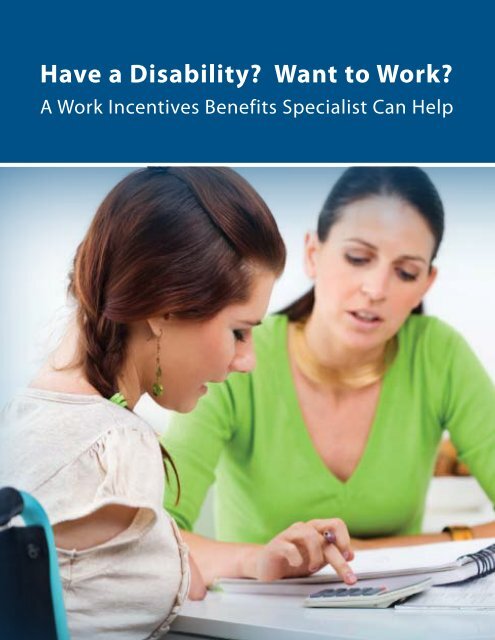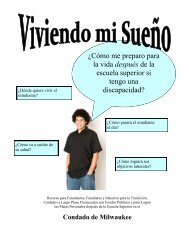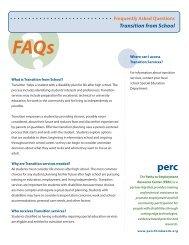Work Incentives Benefits Specialists - Paths to Employment ...
Work Incentives Benefits Specialists - Paths to Employment ...
Work Incentives Benefits Specialists - Paths to Employment ...
Create successful ePaper yourself
Turn your PDF publications into a flip-book with our unique Google optimized e-Paper software.
Have a Disability? Want <strong>to</strong> <strong>Work</strong>?<br />
A <strong>Work</strong> <strong>Incentives</strong> <strong>Benefits</strong> Specialist Can Help
Do you have a disability or know someone with a disability?<br />
Why talk <strong>to</strong> a <strong>Work</strong> <strong>Incentives</strong><br />
<strong>Benefits</strong> Specialist?<br />
When a person with a disability is working or thinking about going <strong>to</strong><br />
work, a <strong>Work</strong> <strong>Incentives</strong> <strong>Benefits</strong> Specialist can help.<br />
<strong>Work</strong> <strong>Incentives</strong> <strong>Benefits</strong> <strong>Specialists</strong> provide benefits advice <strong>to</strong> help an<br />
individual understand the relationship between working and benefits.<br />
Many people with a disability want <strong>to</strong> work, earn more, or start a career. But<br />
one of the biggest obstacles is the fear that doing so will lead <strong>to</strong> a loss of<br />
needed medical benefits, or even a loss in <strong>to</strong>tal income. There are now many<br />
incentives available that make it possible <strong>to</strong> earn more while keeping needed<br />
benefits.<br />
“I need <strong>to</strong> work. But I didn’t trust the system from the get-go. My biggest<br />
fear was that at any time Social Security could require a review of my<br />
disability case because I was working. <strong>Benefits</strong> counseling for me was<br />
just reassurance, reassurance, reassurance - it was peace of mind,<br />
knowing a <strong>Benefits</strong> Specialist was just a phone call away.” – Barbara Jo<br />
Barbara Jo comments on her experience...<br />
A <strong>Work</strong> <strong>Incentives</strong> <strong>Benefits</strong> Specialist provides information needed for making<br />
informed decisions about work. This helps a person understand how earnings<br />
may affect disability payments, healthcare, and other publicly funded benefits.<br />
For people with a disability, work incentives benefits information is an<br />
essential part of getting and keeping a job.
What does a <strong>Work</strong> <strong>Incentives</strong><br />
<strong>Benefits</strong> Specialist do?<br />
<strong>Work</strong> <strong>Incentives</strong> <strong>Benefits</strong> <strong>Specialists</strong> cannot change or get around program rules. But<br />
they can help <strong>to</strong> solve current problems and avoid future problems by communicating<br />
with the various benefits programs and agencies including:<br />
<br />
Social Security Administration (SSA)<br />
<br />
Medicaid & Medicare<br />
<br />
County Economic Support<br />
<br />
Housing Assistance<br />
<br />
Energy Assistance<br />
A <strong>Benefits</strong> Specialist can provide the following:<br />
<br />
A written report<br />
<br />
Answers <strong>to</strong> questions over the phone<br />
<br />
In-person conversations<br />
<br />
Follow-up information as needed<br />
<br />
Assistance in resolving problems with current benefits<br />
Many different decisions can be made with help from a <strong>Work</strong> <strong>Incentives</strong><br />
<strong>Benefits</strong> Specialist. These include deciding...<br />
<br />
<strong>to</strong> work;<br />
<br />
<strong>to</strong> increase work and earnings;<br />
<br />
<strong>to</strong> get the training or resources needed for a new career;<br />
<br />
<strong>to</strong> hold off on such changes for the time being.<br />
“For the longest time I didn’t even know that I could save. Now I’ve got a car and<br />
a mo<strong>to</strong>rcycle – I saved for those things, I worked for those things. I’m not getting<br />
rich, but the system and benefits counseling have provided a lot of incentives <strong>to</strong><br />
work. I’d have probably quit working a long time ago without that. The best thing<br />
about getting benefits counseling is that I haven’t ended up in financial or legal<br />
trouble, and I always seem <strong>to</strong> come out ahead in the long term.” John<br />
A person needs a <strong>Work</strong> <strong>Incentives</strong> <strong>Benefits</strong> Specialist when…<br />
<br />
Considering working for the first time;<br />
<br />
Considering increasing earnings;<br />
<br />
Considering re-entering the workforce;<br />
<br />
Developing a career plan;<br />
<br />
Actively job seeking;<br />
<br />
Having problems with current benefits.<br />
John talks about his experience...<br />
“My benefits counseling has<br />
been mostly problem solving. I<br />
was so frustrated that I felt like<br />
quitting work. But my benefits<br />
counselor got the problem<br />
sorted out, and I kept working.”<br />
John<br />
It is important <strong>to</strong> understand the effects of these decisions. “Knowledge is power” and<br />
knowledge about benefits and available work incentives gives people with disabilities<br />
the power <strong>to</strong> make good choices about work and their future.
Why should I trust a <strong>Benefits</strong><br />
Specialist?<br />
Ava’s S<strong>to</strong>ry<br />
<strong>Work</strong> <strong>Incentives</strong> <strong>Benefits</strong> <strong>Specialists</strong> in Wisconsin receive thorough training<br />
about the public benefits programs that people with disabilities use.<br />
Training includes:<br />
<br />
The rules of the programs<br />
<br />
The work incentives of the programs<br />
<br />
How earnings affect benefits<br />
<br />
Both classroom time and online learning<br />
Ongoing Training<br />
During and after the training, there is help available by phone or email from one<br />
of the trainers. The training and continued support is done by the Wisconsin<br />
Disability <strong>Benefits</strong> Network (WDBN). After the initial training, the WDBN also<br />
offers continuing education opportunities <strong>to</strong> all <strong>Benefits</strong> <strong>Specialists</strong>. This is<br />
important because the rules for public benefit programs often change.<br />
Quality<br />
The <strong>Work</strong> <strong>Incentives</strong> <strong>Benefits</strong> <strong>Specialists</strong> Association (WIBSA) in Wisconsin was<br />
formed <strong>to</strong> ensure consistent quality of services provided. Association members<br />
are required <strong>to</strong> get continuing education and regular peer reviews of their work.<br />
The goal of the Association is that everyone in Wisconsin will have access <strong>to</strong><br />
quality <strong>Benefits</strong> <strong>Specialists</strong> services.<br />
I have been receiving disability because of my mental illness for almost 25 years.<br />
Recently I went off SSDI and began working full time with my current employer.<br />
None of this would have been possible without the help of the benefits specialist<br />
that I worked with while still a full member of the local area clubhouse. I had <strong>to</strong><br />
weigh the pros and cons of going over SGA and decide if this would be a good<br />
thing for me or not.<br />
I learned from the benefits specialist that even if I did go <strong>to</strong> work full time, I would<br />
still qualify <strong>to</strong> receive both Medicare and Medicaid although I would need <strong>to</strong> pay<br />
the cost of the deductible myself. Also, I learned from the benefits specialist that if<br />
I did need <strong>to</strong> leave my full time job, I would be able <strong>to</strong> return <strong>to</strong> receiving disability<br />
benefits in an expedited fashion.<br />
I don’t think I would have known what direction <strong>to</strong> take without the help from<br />
the benefits specialist. They were always ready and willing <strong>to</strong> help me with any<br />
question I might have had. In the end it was my decision as <strong>to</strong> whether I should<br />
return <strong>to</strong> work on a full time basis, but it was helpful <strong>to</strong> me <strong>to</strong> have the additional<br />
input from the benefits specialist.
Table 1: The Wisconsin Benefit Offset Study - No Reported <strong>Benefits</strong> Counseling Before Study<br />
Average Quarterly Earnings<br />
Both Before and After Study Entry<br />
Does benefits advice really help?<br />
People with disabilities and <strong>Benefits</strong> <strong>Specialists</strong> have s<strong>to</strong>ries <strong>to</strong> share that show<br />
how work incentive benefits advice (sometimes called counseling) has made<br />
working easier for people. Along with these s<strong>to</strong>ries and experiences, research<br />
studies show how benefits counseling can help:<br />
<br />
In 2009 a nationally recognized expert in benefits counseling, John Kregel,<br />
shared with Congress some of these s<strong>to</strong>ries backed up by research.<br />
Quarterly Earnings<br />
$1600<br />
$800<br />
$0<br />
Before Study, No<br />
Previous <strong>Benefits</strong><br />
Counseling Reported<br />
$577<br />
$633<br />
No <strong>Benefits</strong> Counseling<br />
(n = 76)<br />
Before Study Entry<br />
2 Years After Study Entry<br />
$915<br />
$1428<br />
<strong>Benefits</strong> Counseling<br />
(n = 227)<br />
<br />
In 2004 the Social Security Administration (SSA) reported that people who<br />
used benefits counseling services started <strong>to</strong> work more after their first meeting<br />
with a <strong>Benefits</strong> Specialist.<br />
<br />
Two studies from the Vermont Division of Vocational Rehabilitation show that<br />
people who received work incentive benefits counseling had a larger increase<br />
in earnings than people who did not receive these services.<br />
<br />
In a study from Connecticut, people who had both benefits counseling and<br />
vocational rehabilitation worked and earned more than those who had<br />
vocational rehabilitation and no benefits counseling.<br />
<br />
A study from Wisconsin showed similar results, as people who received more<br />
hours of benefits counseling saw their average earnings increase. A more<br />
recent look at the study findings, highlighted in Table 1, shows that this<br />
relationship was strong for people who had no reported benefits counseling<br />
before study entry. Table 2 shows the relationship between benefits<br />
counseling and increased earnings was strong for people who had not worked<br />
since qualifying for disability benefits.<br />
<br />
Table 2: The Wisconsin Benefit Offset Study - No Reported <strong>Work</strong> or <strong>Benefits</strong> Counseling Before Study<br />
Quarterly Earnings<br />
$1600<br />
$800<br />
$0<br />
Average Quarterly Earnings<br />
Both Before and After Study Entry<br />
Before Study, No Previous<br />
<strong>Benefits</strong> Counseling<br />
Reported and No <strong>Work</strong><br />
Since Disability<br />
Determination<br />
Before Study Entry<br />
2 Years After Study Entry<br />
$314<br />
$0 $0<br />
No <strong>Benefits</strong> Counseling<br />
(n = 23)<br />
$1007<br />
<strong>Benefits</strong> Counseling<br />
(n = 49)<br />
A document with additional information, including information on how <strong>to</strong> access this and<br />
other studies mentioned in this section can found on the following website:<br />
http://www.percthinkwork.org/resources/list/workincentivesoverview
How <strong>to</strong> get services from a <strong>Work</strong><br />
<strong>Incentives</strong> <strong>Benefits</strong> Specialist?<br />
The services of <strong>Work</strong> <strong>Incentives</strong> <strong>Benefits</strong> <strong>Specialists</strong> are available <strong>to</strong> all persons<br />
with a disability in Wisconsin without cost <strong>to</strong> the individual. Information on<br />
how <strong>to</strong> contact a <strong>Benefits</strong> Specialist is on the back cover of this document.<br />
Funding for these services can be provided by:<br />
Social Security Administration for Social Security Disability program beneficiaries<br />
and recipients<br />
<br />
Division of Vocational Rehabilitation (DVR) for VR service consumers<br />
<br />
Family Care and Family Care Partnership for their members<br />
<br />
Wisconsin Department of Health Services (through at least 2011) <strong>to</strong> over<br />
20 community-based agencies statewide for people eligible, or potentially<br />
eligible, for Medicaid<br />
<br />
Schools, for students with disabilities<br />
“I truly would fear... for clients who did not have a resource such as [a benefits<br />
specialist] <strong>to</strong> direct and guide them. [The Social Security programs’] complexity<br />
level is so intense, many would never be able <strong>to</strong> deal with the issues as they arise<br />
without direction.” Judy, a parent.<br />
“Students with disabilities that transition from High School are provided formal<br />
procedures and strategies from schools <strong>to</strong> address this critical period of time<br />
leading <strong>to</strong> adult life. Education on work incentives can help students better make<br />
this transition and prepare for employment.” Steve Gilles, Transition Consultant,<br />
Wisconsin Department of Public Instruction.<br />
A service provider talks about the value<br />
of work incentives benefits services<br />
“As part of our employment system, we incorporated the option for<br />
members <strong>to</strong> have a work incentive benefit analysis so they are better<br />
able <strong>to</strong> make an informed choice about employment. It has helped <strong>to</strong><br />
eliminate the fears people may have about going back <strong>to</strong> work and<br />
losing their benefits.<br />
It has also been very educational for teams as it helps them understand<br />
how work incentives can assist individuals in returning <strong>to</strong> work. It is<br />
exciting <strong>to</strong> see our individual members grow and become productive<br />
members of their communities.”<br />
Paul Cook, CHP - Community Health Partnership, Inc., Eau Claire,<br />
Wisconsin.
More information<br />
Find a <strong>Work</strong> <strong>Incentives</strong> <strong>Benefits</strong> Specialist:<br />
Ticket <strong>to</strong> <strong>Work</strong> with Social Security <strong>Work</strong> <strong>Incentives</strong> Planning and Assistance (WIPA) providers:<br />
http://www.yourticket<strong>to</strong>work.com/wipas<br />
In Wisconsin<br />
<br />
<br />
<br />
<br />
Call 1-800-710-9326 for information and assistance from <strong>Employment</strong> Resources, Inc.<br />
Ask your DVR counselor<br />
Find a <strong>Benefits</strong> Specialist Tool: http://www.eri-wi.org/benefitspecialists.htm<br />
Wisconsin <strong>Work</strong> <strong>Incentives</strong> Benefit Specialist Association: http://www.wibsa.org<br />
Training, resources, research about employment and disability related <strong>to</strong>pics:<br />
<strong>Paths</strong> <strong>to</strong> <strong>Employment</strong> Resource Center<br />
Email: contact@percthinkwork.org<br />
Web: www.percthinkwork.org<br />
“You don’t have <strong>to</strong> do it alone. I would never have been able <strong>to</strong> do it alone…!”<br />
Barbara Jo<br />
Created in collaboration by<br />
Wisconsin Department of Health Services<br />
Wisconsin Disability <strong>Benefits</strong> Network (WDBN)<br />
<strong>Employment</strong> Resources, Inc.<br />
<strong>Paths</strong> <strong>to</strong> <strong>Employment</strong> Resource Center (PERC)<br />
University of Wisconsin-S<strong>to</strong>ut<br />
Wisconsin <strong>Work</strong> <strong>Incentives</strong> <strong>Benefits</strong> <strong>Specialists</strong> Association (WIBSA)<br />
Funded by<br />
Funded in part by the Centers for Medicare and Medicaid, Medicaid Infrastructure Grant, CFDA<br />
No. 93.786, Wisconsin Department of Health Services/Pathways <strong>to</strong> Independence.





